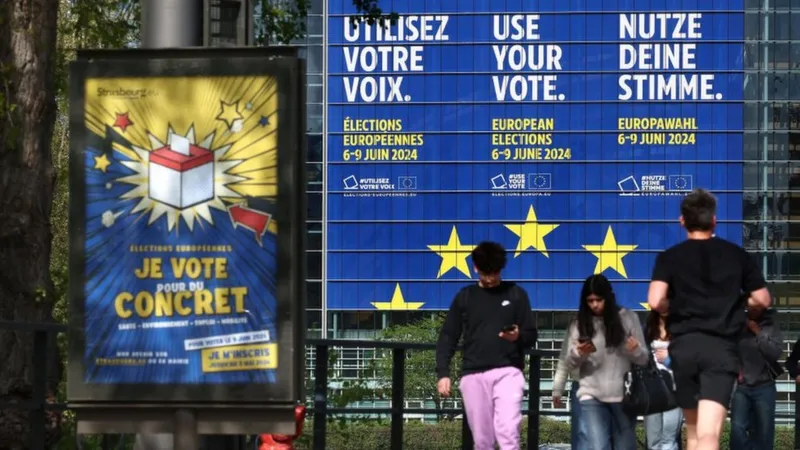Belgium probes Russian interference in EU elections
 As the European Parliament elections loom closer, Belgium has made startling revelations about ongoing investigations into pro-Russian networks attempting to sway the vote. Prime Minister Alexander de Croo highlighted Moscow's concerted efforts to infiltrate European politics, aiming to bolster support for pro-Russian candidates within the European Parliament. The implications of such interference extend beyond mere political influence; they pose a direct threat to the stability and security of both individual nations and the European Union as a whole.
As the European Parliament elections loom closer, Belgium has made startling revelations about ongoing investigations into pro-Russian networks attempting to sway the vote. Prime Minister Alexander de Croo highlighted Moscow's concerted efforts to infiltrate European politics, aiming to bolster support for pro-Russian candidates within the European Parliament. The implications of such interference extend beyond mere political influence; they pose a direct threat to the stability and security of both individual nations and the European Union as a whole.
Belgian intelligence, in coordination with counterparts across Europe, has unveiled the presence of spy networks operating within its borders and several other European countries. These networks, allegedly supported and funded by the Kremlin, have been actively engaging with European lawmakers, offering financial incentives to promote a Russian agenda. While no names of suspected recipients of funds have been disclosed, the scope of the investigation underscores the severity of the issue at hand.
Central to Moscow's strategy is the dissemination of propaganda through various channels, including media outlets like the Voice of Europe news website. Intelligence agencies in countries such as the Czech Republic and Poland have pointed to the website as a tool used by Russia to spread its narrative and provide financial backing to sympathetic European politicians. The allegations against the Voice of Europe remain unanswered, highlighting the clandestine nature of such operations and the challenges in holding perpetrators accountable.
Reports suggest that politicians across the ideological spectrum, particularly those on the far right, have been targeted for collaboration with pro-Russian interests. The promise of financial support in exchange for espousing pro-Russian sentiments has raised concerns about the integrity of the democratic process leading up to the European Parliament elections. Instances such as the vehement denial by a candidate from Germany's far-right AfD party underscore the sensitivity surrounding allegations of collusion with foreign entities.
Guarding Against External Threats
Prime Minister de Croo's assertion of Belgium's commitment to ensuring a free and fair electoral process underscores the gravity of the situation. With Brussels serving as a pivotal hub for both the European Commission and the European Parliament, the need to safeguard against external influence becomes imperative. The proximity of these institutions to potential sources of manipulation heightens the urgency for comprehensive measures to counteract foreign interference.
The implications of the pro-Russian network extend beyond the borders of individual nations, posing a significant threat to EU security as a whole. Czech Prime Minister Petr Fiala's warning underscores the potential ramifications of allowing such networks to operate with impunity. By imposing sanctions on entities involved in perpetuating pro-Russian propaganda, the Czech government demonstrates a commitment to upholding both national and EU security interests.
Safeguarding Democratic Integrity
At its core, the issue of foreign interference in European politics strikes at the heart of democratic integrity. The right of European citizens to participate in free and fair elections must be protected from external manipulation. The revelations of pro-Russian networks operating within Europe serve as a stark reminder of the ongoing battle to preserve the sovereignty of democratic institutions against external threats.
Addressing the challenges posed by foreign interference requires a multifaceted approach encompassing diplomatic, legislative, and intelligence efforts. Cooperation between European nations, as well as engagement with international partners, is crucial in combating the insidious influence of foreign actors seeking to undermine democratic processes. Additionally, measures to enhance transparency and accountability within political systems can help mitigate the vulnerabilities exploited by external adversaries.
The uncovering of pro-Russian networks attempting to influence European politics ahead of the upcoming Parliament elections underscores the magnitude of the challenge facing democratic societies. The concerted efforts by governments across Europe to address this threat reflect a collective commitment to upholding the principles of democracy and safeguarding the integrity of electoral processes. As the continent prepares to cast its ballots, vigilance against external interference remains paramount in preserving the sovereignty and stability of the European Union.
































